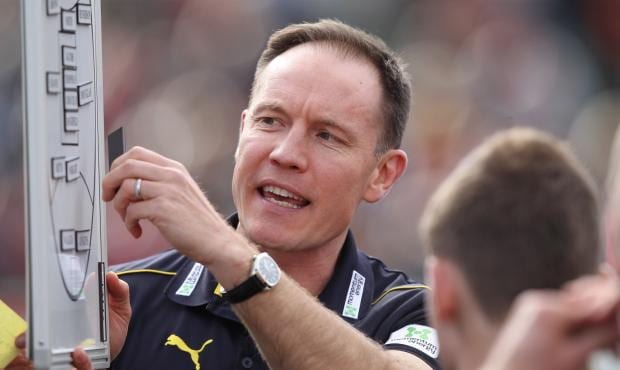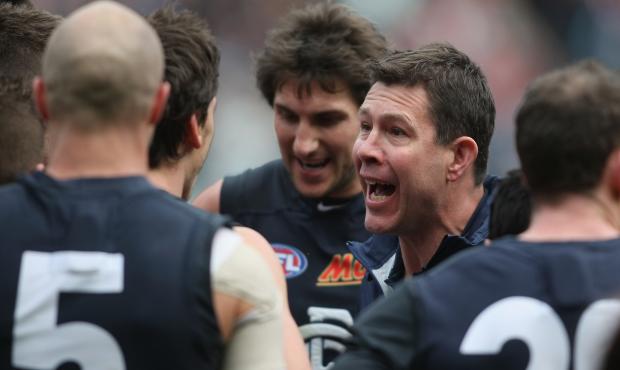ESSENDON has won two of its past 12 games.
One loss was by more than 100 points and two were by more than 10 goals.
The Bombers have dropped from ninth to 15th and dropped 22 percentage points in that time.
In statistical terms, the club has wandered into an area that gets coaches sacked.
That doesn't mean the Bombers are set to move on coach James Hird.
Hird has another year on his contract and external circumstances look set to play a greater role in decisions about the future of the coach than Essendon's win-loss ratio.
Most put the ugly win-loss record down to the combined effect of the WADA appeal, the state of the list and the loss of draft picks in 2013 and 2014 as part of the penalties for poor governance cruelling any chance of re-establishing the team as an on-field force.
In reality, the Bombers did well to snag Zach Merrett, Kyle Langford and Jayden Laverde in the past two drafts, but they lost Paddy Ryder and Stewart Crameri in the process.
By contrast, their conquerors on Sunday, the Western Bulldogs, added Marcus Bontempelli, Crameri, Tom Boyd (who did not play on Sunday), Bailey Dale, Caleb Daniel and Shane Biggs in the past two off-seasons, as well as several talents sprinkled through the VFL who shape as long-term prospects.
Such penalties as the Bombers have faced have an enormous effect, not only on game day, but in terms of training standards – a fact often underestimated.
With swingman Jake Carlisle still unsigned, super recruits Brendon Goddard, Adam Cooney and Paul Chapman unlikely to get any better, and Dustin Fletcher and Jason Winderlich doubtful to play again, the list has taken on the look of a renovator's delight.
Hird's hopes for a quick turnaround rests with the return next season of a starting midfield of David Myers, Jobe Watson, Heath Hocking and Tom Bellchambers, and the pacy Travis Colyer, who had emerged this season before injury struck.
The Bombers have a solid spine with Michael Hurley and Cale Hooker in career-best form, and Joe Daniher an exciting prospect.
The biggest knock on the way the Bombers play is that they mess around with the football. Ranked seventh for disposal differential and fifth for average disposals (behind the top four teams), they want to exit defence via the V-shape too often.
Although most of their scores come from this switch out of the defensive 50, it is predictable and doesn't force contests, meaning they are creating players who are good on the outside (fourth for uncontested differential) but struggle to win contests (15th for contested possession).
Winning the contest was an area they improved under Mark Thompson. However they have regressed once again under Hird in that key component.
And they struggle to score, ranking last for scores per inside 50, a problem under both Thompson and Hird.
A loss this week to Greater Western Sydney will see Hird's career winning record drop below 50 per cent for the first time since round 19, 2011 – his first year in charge.
Hird's win-loss record in 2015 sits at 29.4 per cent – dangerous territory for a coach in his fourth season at the helm.
Of the coaches replaced at the end of last season, former Western Bulldogs coach Brendan McCartney had the worst win-loss record in his final season, winning just seven games.
Of course, McCartney's removal was based more on player sentiment than win-loss. And he did not suffer a 100-point loss during his three years at the club.
Adelaide replaced Brenton Sanderson despite him presiding over 10 wins in the final of his three seasons. His last game as coach was a 79-point win over St Kilda. He ended his stint with a 58 per cent winning record and a preliminary final appearance.
Brenton Sanderson had a 58 per cent record at the helm of Adelaide. Picture: AFL Media
Guy McKenna was removed by Gold Coast with one year remaining on his contract after winning 10 games in his fourth season as coach of the fledgling club.
The Suns lost six of their last seven in 2014 without Gary Ablett to miss the finals. McKenna's winning record had trended upwards throughout his tenure and was 45 per cent in his final season.
Record-breaking coach Mick Malthouse coached just eight games this season for one win before being sacked, recording a winning percentage of less than 30 per cent in just two of his 30 completed seasons before 2015.
But that veteran coach is in a different category when it comes to such discussions.
Of more recent times, Port Adelaide's Matt Primus, St Kilda's Scott Watters and Melbourne's Mark Neeld had the lowest winning percentage when sacked, with 27.8, 22.7 and nine per cent respectively in the year their senior coaching career ended.
Essendon's previous coach, Matthew Knights, had a winning record of 31.82 per cent in his final season as Bombers coach.
Michael Voss had a winning record of 42.11 in his final season in the job, winning eight of the first 19 games and avoided a 100-point loss in his 107-game coaching career.
Brett Ratten did the same in his 116-game career (no losses of more than 100 points) finishing with a 51.29 per cent winning record, including a 50 per cent record in his final season.
Of course, Hird has had his team firing at various times, recording a winning record above 50 per cent in the three seasons before he was suspended and no club has dealt with a more disruptive period in its history.
In the normal course of events, this year would be seen as a temporary dip that might pre-empt a re-appraisal.
But Hird is not living through a normal course of events.
You would expect Hird to survive the remainder of this season unless things quickly head south.
But the start of next season has suddenly become very important.
Brett Ratten finished with a record better than 50 per cent. Picture: AFL Media



